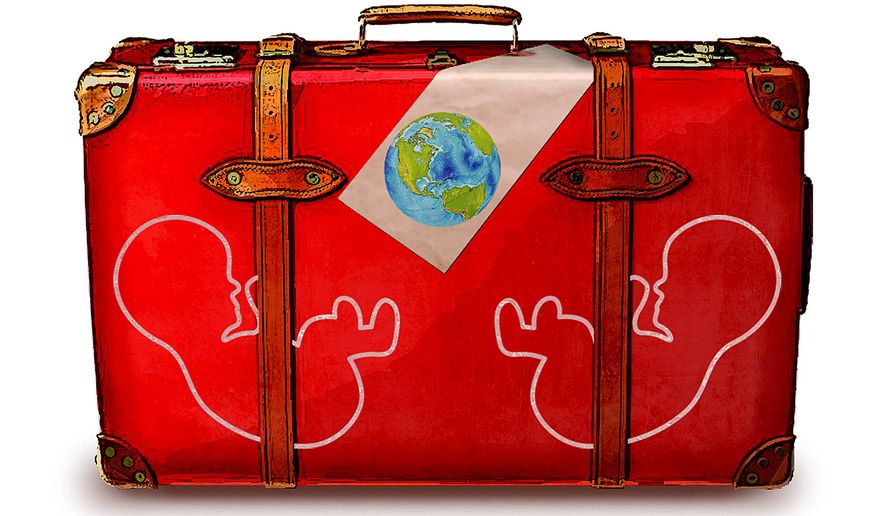OPINION:
Much of the media has ridiculed businessman Nick Loeb, the former fiance of actress Sofia Vergara, the star of the sitcom “Modern Family,” because he filed a lawsuit to prevent Ms. Vergara from destroying the frozen embryos they created together in 2013. But many in the pro-life community have rallied behind him, viewing the embryos that were created by Mr. Loeb and Ms. Vergara as persons deserving protection by the state.
Claiming that he is committed to the well-being of his two pre-born daughters, Mr. Loeb filed an amended motion on May 14 in Superior Court of the State of California in Santa Monica, seeking full custody of the frozen female embryos — including the ability to bring them into the world. In this new motion, Mr. Loeb has also added claims against Ms. Vergara for breach of contract for reneging on verbal and written agreements to allow the birth of the embryonic children they conceived.
As the father of the two female embryos, Mr. Loeb would seem to have a strong case. But most media commentators — including New York University ethicist Arthur Caplan — have dismissed Mr. Loeb’s claims. In an interview on CNN, Mr. Caplan claimed that “Loeb can keep the embryos as long as he pays the fees and keeps them frozen, but he’s never going to touch them for reproductive purposes.”
However, Mr. Caplan is hardly a disinterested bystander. He has already stated a bias against the idea of embryonic adoption — especially against the use of the term “snowflake babies.” Snowflake babies is a term used by pro-life organizations committed to the adoption of embryos left over from in vitro fertilization. Former president George W. Bush promoted the adoption of these embryos — funding organizations that facilitated the adoptions and making public appearances with some of the “snowflake children” who were born following embryo adoption as part of his campaign to end embryonic stem cell research. In response to the Bush administration’s support for the embryo adoption program, Mr. Caplan posted a 2003 commentary on NBCnews.com claiming that “using terms like ’adoption’ encourages people to believe that frozen embryos are the equivalent of children. But they are not the same.”
Indeed, this is the real argument here. Nick Loeb, like the entire pro-life community, views embryos as pre-born persons — deserving of every protection and every opportunity to be brought into this world. Mr. Loeb and Ms. Vergara created these embryos together with that intention — and Mr. Loeb is simply asking for Ms. Vergara to allow him to fulfill the obligation he believes he owes to these pre-born babies.
It seems that the state of California may share that belief. The California legislature has recognized that unborn children have potential interests and, therefore, enacted California Civil Code 43.1, which states that “a child conceived but not yet born is deemed an existing person, so far as necessary for the child’s interests in the event of the child’s subsequent birth.” The U.S. Supreme Court recognized in 1989 in Webster v. Reproductive Health Services that the state has an important and legitimate interest in the “potentiality of human life.” Webster also held that “the state’s interest in protecting potential human life” exists and is compelling even before the viability of the potential human life.
For the first time in history with regard to embryonic children, Mr. Loeb’s May 14 filing in California Superior Court simply asks the court to consider the state’s interest in potential life. His argument is that “where there is disagreement over what should be done with embryos, this interest should create a presumption in favor of the person who wants to bring them to term.” His petition asks for nothing from Ms. Vergara — except the ability to allow the embryos they conceived together to come into the world. While Ms. Vergara has suggested that Mr. Loeb is seeking publicity, his initial filing with the court was done as a John Doe petition in order to protect her. Yet in the amended petition filed with the court last week, Mr. Loeb alleges that on April 17, Ms. Vergara’s attorney made a statement to People magazine publicly confirming the identities of Mr. Loeb and Ms. Vargara for the first time.
It is clear that Mr. Loeb’s only goal is to bring his children into the world. In the initial court filing, he maintains that he frequently expressed his desire to have a family, and made plans to start a family immediately. Mr. Loeb disclosed to Ms. Vergara that he is pro-life and “believes that life begins at the moment an egg is fertilized by a sperm.” He claims to have expressed these views to Ms. Vergara — with her stating that “she was a devout Catholic and therefore believes that life begins at conception and should not be destroyed.”
While many commentators continue to dismiss the merits of this case, it is likely that Mr. Loeb will continue to gain support from those who value the dignity of the pre-born child. Although many in the pro-life community could not have supported Ms. Vergara and Mr. Loeb’s choice to engage in the use of a surrogate to carry the children they conceived together, none would wish for the intentional destruction of these pre-born children. The courts will make the final decision — but as Webster has held, the state’s interest in protecting potential human life exists and is compelling.
• Anne Hendershott is professor of sociology and director of the Veritas Center for Ethics at Franciscan University. She is the co-author of “Renewal: How a New Generation of Catholic Priests and Bishops are Revitalizing the Church” (Encounter Books, 2013).




Please read our comment policy before commenting.